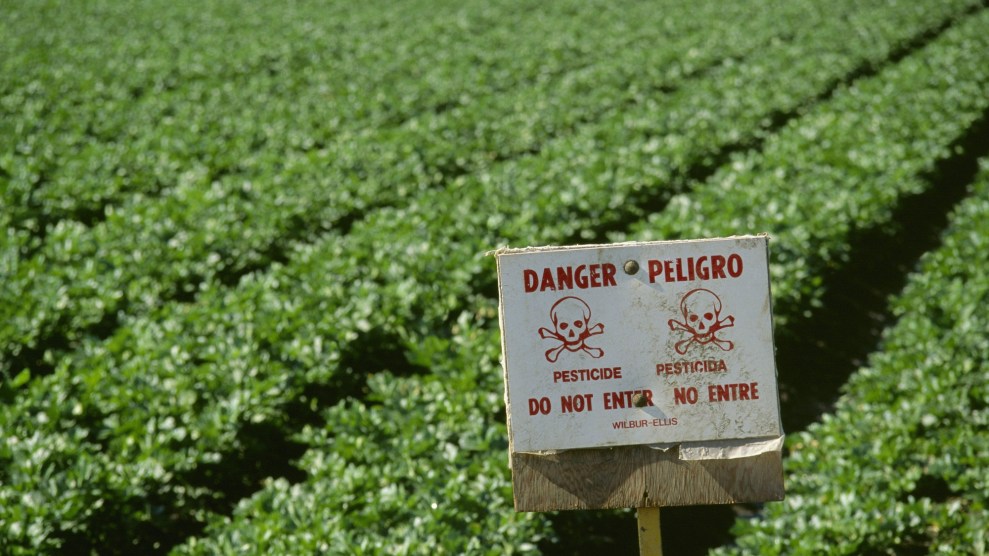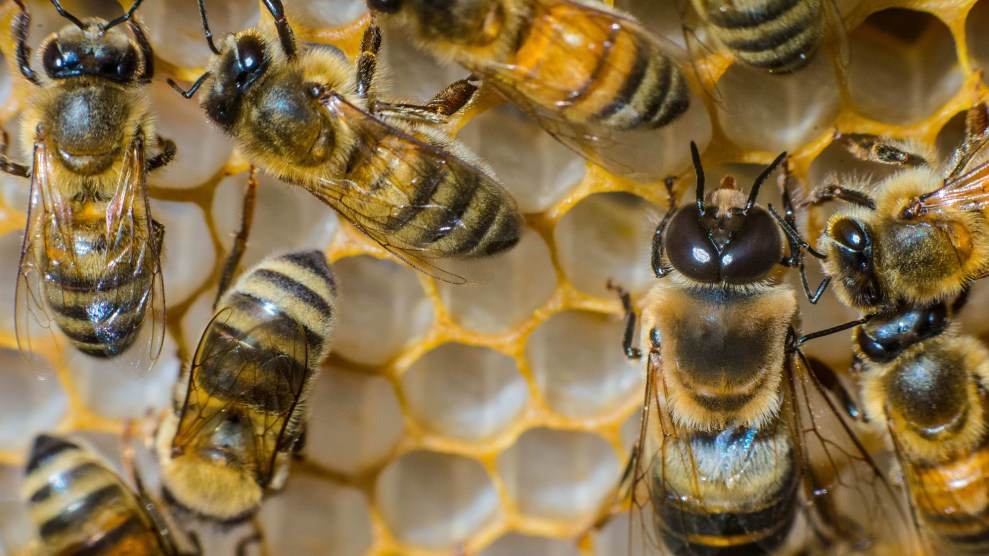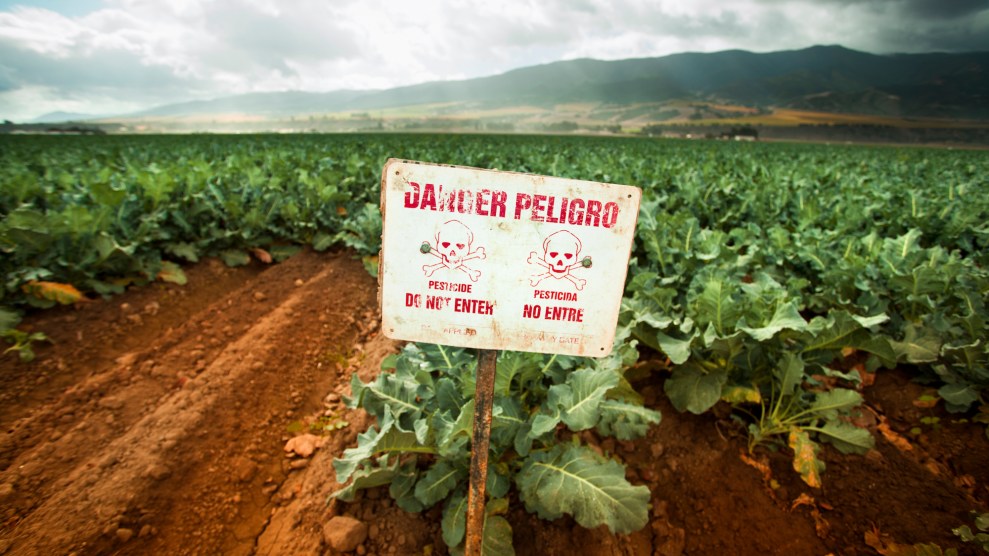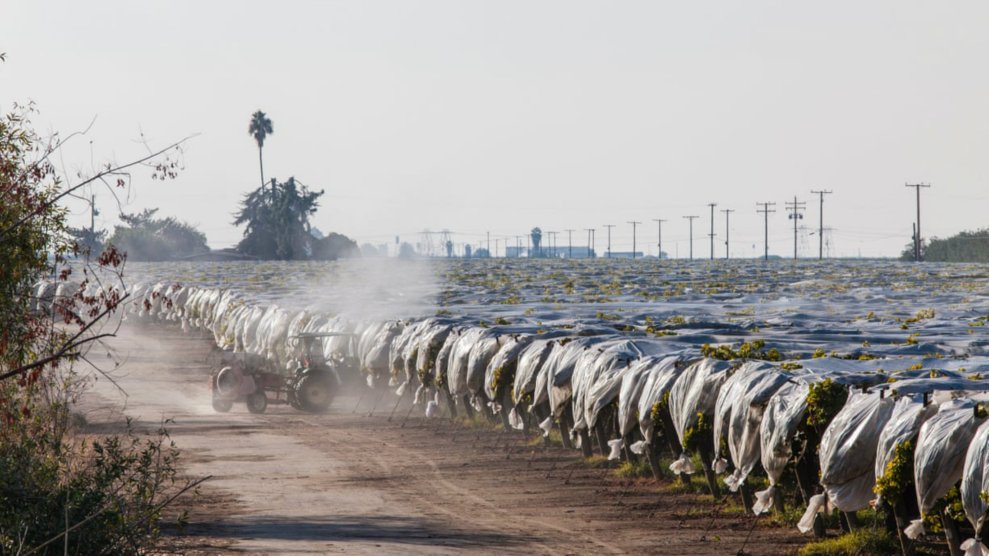
A warning sign posted at the edge of a celery field is used to indicate that the field is unsafe to enter shortly after an application of pesticide in Salinas Valley, California.Jack Clark/DPA/ZUMA
As this year’s temperatures continue to break records, farmworkers who toil in the heat remain one of the groups most vulnerable to heat-related illnesses. But another element of their jobs is making extreme heat even more dangerous: pesticide drift.
When it is hotter outside, pesticides tend to evaporate faster, explains Nicole Deziel, an environmental health scientist at the Yale School of Public Health. This, in turn, impacts how much of the pesticide actually reaches the crop. Any that doesn’t usually sticks around in the air—and can travel miles offsite. Pesticide drift means that the toxic chemicals spread further than ever intended, affecting farmworkers and adjacent communities.
Once airborne, those pesticides can linger in surrounding air for as long as five days, according to reports authored by the Pesticide Action Network, an advocacy coalition that opposes their pervasive use in industrial agriculture. Pesticide drift is a common problem that affects nearly every farming community in the US—whether crops are sprayed by hand, through fumigation, or via planes.
Now, the federal government is finally trying to tackle the issue. In mid-July, the Environmental Protection Agency announced rules that would incorporate pesticide drift into its guidelines for approving new products and active ingredients: it plans to assess drift-related health risks “earlier in the agency’s review process,” the EPA said in a press release. While the release didn’t directly mention climate change or extreme heat, the agency did tell Mother Jones that environmental justice was a key factor in the guideline change.
“With this change, the agency is furthering protections to bystanders wherever pesticide spray drift may occur, and thereby strengthening protections associated with the use of pesticide products,” said EPA spokesperson Tim Carroll.
The EPA’s new rules are intended to protect people from the effects of drift. But Jeannie Economos, a pesticide health and safety officer for the Farmworker Association of Florida, is skeptical that they will be effective, particularly because the guidelines only outline drift as a concern for mostly new products. The only existing products to get reviewed will be pesticides that manufacturers are trying to apply for a purpose not previously approved. (The EPA does periodically review pesticides that it has already approved, and on Tuesday banned one, Dacthal, because of the reproductive health risks it posed to pregnant people.)
The tendency of pesticides to evaporate under heat is so well documented that multiple agricultural agencies and university departments have put out specific guidelines asking farmers and growers to be mindful of the temperature in order to reduce potential drift. A study published last year in the journal Nature found that hotter and more humid conditions brought about specifically by climate change made pesticides evaporate more quickly.
But one important part of understanding pesticide drift on a hotter planet is that we don’t know exactly how every pesticide will react to extreme heat—information that could be vital to understanding how long they’ll stick around post-application, and how far they’ll travel, according to Emily Marquez, senior scientist at the Pesticide Action Network. “Now that it’s getting hotter, there’s maybe more potential for things to change, or be less predictable,” says Marquez.
That makes farm work more dangerous in a number of ways, says Yale’s Deziel. “If it is hot, workers may be less likely to wear full, personal protective equipment—they may have more skin exposed,” she says.
Even if workers do wear personal protective equipment, like gloves, heat can actually increase the amount of pesticides that penetrate safety gear, according to research published in the International Journal of Environmental Research and Public Health in 2019.
Deziel, who has been studying pesticides for more than a decade, points out that the health risks are not negligible: everything from nausea, skin irritation, or headaches in after short-term exposure to problems to cancer, reproductive problems, and neurological effects after long-term exposure.
Economos has been working on the issue for decades, and has worked with the EPA and other agencies to try to ensure that proposed rules or guidelines put farmworkers first. Often, she says, even after rules change, there’s more work to be done.
“We fought for 20 years and we won in 2015 to get better protections for workers [from pesticides],” she said. “So it took only 20 years to do that. But then you have the problem of compliance and enforcement.”
Another complicating factor, she says, is that a huge portion of farmworkers endangered by pesticide drift are immigrants. Most US farmworkers are foreign-born, and many take part in a seasonal immigration program, the H-2A visa, which means they are authorized to come into the country to assist growers with different aspects of the growing season, particularly harvesting, and must then return to their country of origin. In 2022, over 350,000 people came into the US through the H-2A program.
A large, temporary, nonresident workforce means that for any exposures that happen, a large portion of people won’t be in the US long enough for longer-term or chronic illnesses from pesticide exposure to appear, according to Economos. An untold number of workers cycle in and out of the program, she says—and might never return, because people with health conditions are often not accepted in following years. If a short-term illness arises, workers are disincentivized from complaining, since their employer controls access to their immigration status and housing.
The EPA did not respond in time to questions about farmworkers’ employment or immigration conditions being used to suppress reports of pesticide exposure.
A 2024 Univision investigation found that after a worker in North Carolina, José Soria, was exposed to an herbicide based on the toxic compound paraquat, in 2020, his employer discouraged him from seeking medical care for painful blisters that developed on the left side of his body. He eventually required surgery to reconstruct the skin that was exposed.
In Economos’ eyes, simply regulating pesticides is too small a step given the scale of harm they cause—instead, she says, we should be thinking about ways of farming that reduce or eliminate pesticide use.
“If they really wanted to protect farmworkers, then they wouldn’t be approving these horrible formulations,” she says.

















